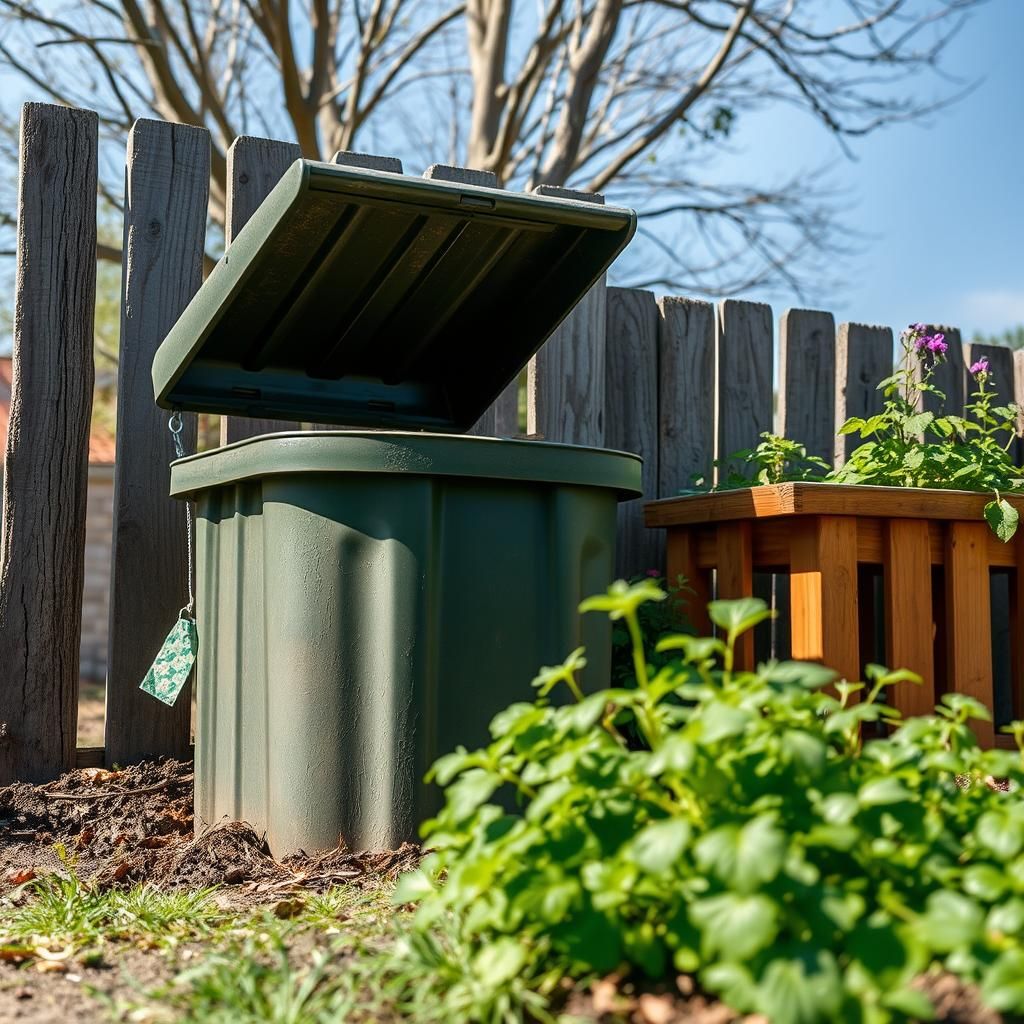Should Compost Be in Sun or Shade? Discover the Best Location for Your Compost Bin!

Finding the ideal location for your compost bin is crucial to maximizing the efficiency of your composting process. A common question among gardeners is whether compost should be placed in sun or shade. Each environment offers distinct advantages and challenges that can affect the decomposition process. Understanding the specific needs of your compost and the local climate can help you determine the best spot for your bin. In this article, we will explore the pros and cons of composting in both sunny and shady locations, guiding you to make an informed decision for optimal results in your composting endeavors.
Should Compost Be in Sun or Shade?
Placing your compost heap in the right location is crucial for its efficiency and effectiveness. While both sun and shade can influence the composting process, the key factor is the balance between temperature and moisture. Sunlight can help raise the temperature of the compost pile, which accelerates the breakdown of organic materials, especially in cooler climates. However, too much sun can dry out the material, resulting in a lack of moisture, which is essential for microbial activity. Conversely, a shaded area keeps the compost cooler and retains moisture, thus fostering a stable environment for decomposition. Ideally, placing your compost in a spot that receives partial sun—where it can benefit from warmth and some protection from harsh drying conditions—is often the best approach.
Benefits of Sunlight for Compost
Sunlight plays a vital role in the composting process by increasing the overall temperature of the pile. A warmer environment encourages the growth of thermophilic bacteria, which are responsible for rapid decomposition. The elevated temperatures not only help break down organic matter more quickly but also reduce the likelihood of pests and pathogens. However, it is essential to monitor the moisture level, as direct sunlight can lead to drying out the compost. Therefore, finding a balance between sunlight and moisture retention is key.
Advantages of Shaded Composting
Composting in a shaded area can offer several advantages, particularly in hot climates. Shade helps maintain a consistent material moisture, which is crucial for the decomposition process. This consistency encourages a diverse community of microorganisms essential for breaking down organic matter. It can also prevent the compost from overheating, which may lead to a breakdown of beneficial bacteria. In addition, shaded compost piles are less likely to emit unpleasant odors, as overly dry conditions can sometimes lead to anaerobic decomposition, resulting in foul smells.
Impact of Climate on Compost Location
Different climates can greatly affect the choice of location for your compost. In warmer regions, full sun exposure might lead to overheating and dryness, making it beneficial to select a partially shaded area. Meanwhile, in cooler climates, sunlight can help raise the internal temperature of the compost pile, speeding up decomposition. Understanding your local climate and its seasonal changes is essential for optimizing your composting strategy and ensuring that your materials break down efficiently.
See also:
Maintaining Moisture Levels
Regardless of whether your compost is in the sun or shade, maintaining moisture levels is critical for the success of the composting process. If the compost pile dries out—the result of being too exposed to the sun or not being watered adequately—the microbial activity will slow down significantly. It’s advisable to monitor the moisture content and turn the pile regularly to aerate it. If it appears dry, adding water or wet materials can help reinvigorate the compost while retaining the necessary moisture balance for effective decomposition.
Adjusting Compost Location Seasonally
Adjusting the location of your compost pile with the seasons can also enhance its efficiency. In the summer, moving it to a shaded area may help prevent overheating, while in the spring or fall, a sunnier spot might assist in warming the pile. By paying attention to the seasonal temperatures and moisture, you can optimize the composting process throughout the year. This seasonal adjustment can lead to a more efficient breakdown of organic waste, yielding rich compost for garden use.
| Factor | Sun | Shade |
|---|---|---|
| Temperature | Higher, promotes bacteria | Lower, stable environment |
| Moisture retention | Can dry out | Better retention |
| Speed of decomposition | Faster breakdown | Slower but steady |
| Odor control | May lead to odors | Less likely to smell |
Optimal Conditions for Composting: Sunlight Exposure
The location of your compost bin significantly affects the decomposition process. When compost is placed in a sunny area, the heat generated can accelerate the breakdown of organic materials, promoting microbial activity and reducing the overall composting time. However, excessive sunlight can lead to dryness, hindering the vital moisture balance needed for effective composting. Therefore, striking a balance between sunlight and shade allows for an ideal environment where microorganisms thrive while preventing overheating and dehydration.
Benefits of Sunlight for Compost
Exposing your compost bin to ample sunlight boosts the temperature within the pile, thereby enhancing the thermophilic phase of decomposition, which can kill off pathogens and weed seeds. This natural heat helps to break down organic matter more efficiently, resulting in faster compost production. Furthermore, sunlight can also aid in reducing the moisture levels in the compost, which can be beneficial if your materials are too wet.
Drawbacks of Excessive Sun Exposure
While sunlight promotes microbial activity, too much exposure can have adverse effects. Over time, excessive heat and sunlight can lead to the drying out of the compost, resulting in slowed decomposition. When the compost becomes too dry, beneficial microorganisms may die off, and the composting process can become stagnant. It's essential to monitor moisture levels and ensure regular turning of the pile to maintain a healthy balance.
See also:
Advantages of Shaded Composting
Placing your compost bin in a shaded area helps retain moisture, which is crucial for effective decomposition. Shady spots can prevent the pile from becoming too dry, allowing microbial life to thrive. This can lead to areas of slow decay, which can ultimately produce high-quality compost over a longer period but requires careful management to counterbalance the lower temperatures that may prolong the process.
Challenges of Composting in the Shade
Composting in shaded areas can pose challenges, particularly in regions with cooler climates. The lower temperatures can slow down the composting process, making it difficult to achieve the ideal heat needed for rapid decomposition. Additionally, if the pile becomes too cool, it may not reach a high enough temperature to kill off pathogens or weed seeds effectively, potentially affecting the quality of the final compost product.
Finding the Right Balance
Ultimately, the best approach to composting is to find the right balance between sunlight and shade based on your local climate and seasonal changes. Ideally, a location that receives partial sun can provide both warmth to encourage microbial activity and enough moisture retention to sustain it. Regularly monitoring the compost's temperature and moisture levels will help you adjust its location as needed to optimize the decomposition process.
Questions from Our Readers
Should compost be in sun or shade?
The ideal location for your compost pile depends on your climate; however, it is generally recommended to place it in a shaded area. Direct sunlight can dry out the materials too quickly and hinder the decomposition process, while a shaded spot helps retain moisture.
What are the benefits of composting in the shade?
Composting in the shade can help maintain an optimal temperature and moisture level, which are crucial for microbial activity. Microorganisms thrive in a more stable environment, leading to a faster and more efficient decomposition.
See also:
Can compost get too hot in the sun?
Yes, compost can become excessively hot if placed in direct sunlight, potentially reaching temperatures that are detrimental to the microbial life essential for breaking down organic materials. This can lead to a slower composting process or even kill beneficial organisms.
How does sunlight affect the smell of compost?
Excessive sunlight can lead to drying, which may cause a compost pile to become aerobic and produce foul odors. Maintaining a balance with shade helps to keep the pile moist, reducing unpleasant smells while promoting healthy aerobic decomposition.

If you want to read more articles like Should Compost Be in Sun or Shade? Discover the Best Location for Your Compost Bin!, we recommend you check out our Compost category.
Leave a Reply
Related Articles